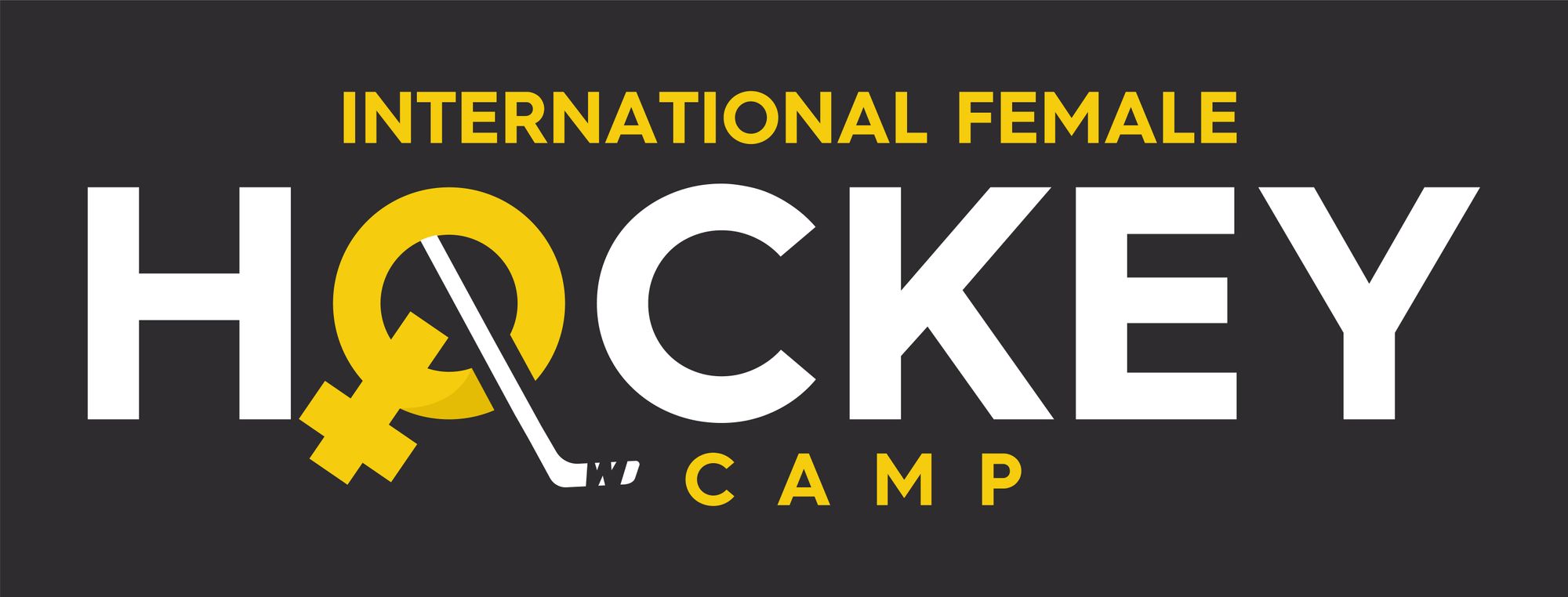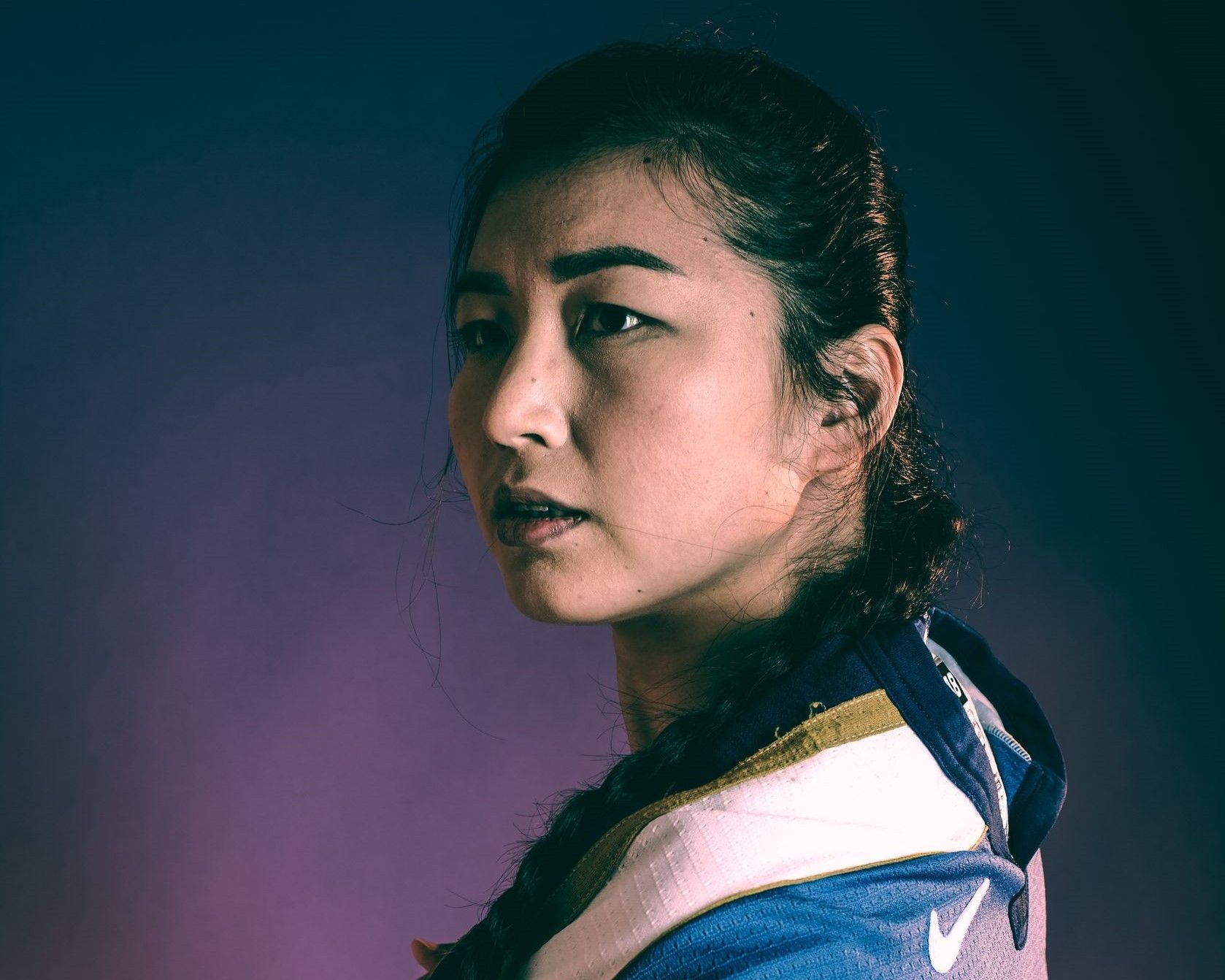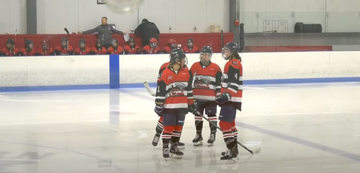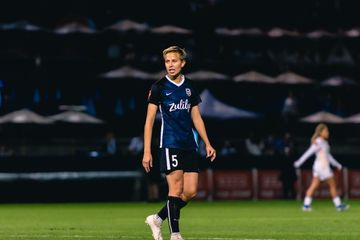After two seasons working towards her goal of playing in a top North American league, Bulbul Kartanbay found her opportunity with the Metropolitan Riveters in 2019. In her first NWHL season, Kartanbay experienced a lot of growth. Behind the scenes, though, she also faced her share of setbacks. As she prepares for the upcoming year, Kartanbay is channeling her energy towards moving past those obstacles -- and thriving.
The NWHL's first Kazakh player experienced challenges in her first season that few could fully understand: language barriers, cultural differences, getting settled in a new country. On top of that, there was the seemingly endless stream of paperwork required to live in the United States as a Kazakh national. As is the case for many international athletes, getting a U.S. visa was a complex process. Issues with processing documents led to Kartanbay's salary being delayed until halfway through the season. The Riveters supported her with help finding accommodations and an assistant coaching position at a local high school, but beyond these major hurdles there were countless small aspects of everyday life that required further documentation.
Early in the year when Kartanbay wanted to put in extra hours of training to develop her game, she had no transportation to make her way to the rink. Getting a vehicle was an obvious solution, but that, too, came with extra work, such as buying automobile insurance and obtaining a valid U.S. driver's license.
"Nobody knows about how difficult it is for us [international athletes]," she remarks. "You can't really focus on games or practices when you have lots of issues and stuff that's going on and you have to fix it."
Last December, with half a season under her belt and many of the obstacles finally out of her way, Kartanbay figures she was just beginning to reach her potential when a concussion sustained in a car accident derailed her year.
"It was terrible for me because I really was in my best shape ever," she recalls. "I'd never had that type of training, off-ice and on-ice."
Kartanbay was well-supported by the league's medical staff in her recovery, but what she'd hoped would be an off-season of learning and development instead had to be dedicated to regaining her health. Just as she began to feel better, her progress was further slowed by closures due to the COVID-19 pandemic, which prevented standard training. What had once seemed like forward momentum slowly turned to stalling and uncertainty. Then, at the end of the season, the Riveters had informed her that they'd be contacting players later in the year as they constructed their 2020-21 roster. With gyms and rinks shut down and no game time since December, Kartanbay was particularly concerned about her status heading into the new campaign.
"I was really worried after my concussion about this next season," she explains. "Because, you know, who needs an injured player?"
When the Riveters finally reached out in late July, it was with bad news: they informed Kartanbay that their roster was full and she wouldn't have a place on the team. That sent Kartanbay scrambling to research other options to continue developing her game in North America. She applied for different teams and was relieved to hear back from the PWHPA. She has been in touch with the New Hampshire region and although she was out of the country and unable to attend tryouts, she anticipates having an opportunity to demonstrate her skills upon her return. She's also a member of the North Jersey Phoenix, a top-level recreational team in the United Women's Hockey League based out of Monmouth Junction, New Jersey, which is assisting with some of her paperwork.
Back in 2018-19, Kartanbay trained with and attended try-outs for the CWHL's Calgary Inferno. That season, the Inferno's stacked roster led them all the way to a Clarkson Cup championship. She didn't make the team that year and instead spent the season with the Calgary Coyotes of the Southern Alberta Women's Hockey Association. But that tryout was an opportunity to challenge herself among some of the most accomplished athletes in the sport. With the PWHPA, Kartanbay looks forward to a similar chance to test herself against top-division national team stalwarts.
Despite the uncertain lead-up to the season, Kartanbay is hopeful that increased off-ice stability will improve her game. Her health insurance paperwork is nearly done, and she's got a car to get to and from training whenever she wishes. She's also got a new role, helping as head coach of a 14UAA team with the Princeton Tiger Lilies, a competitive girls' program in New Jersey. Kartanbay is not new to coaching; she got her start at around age 20 in Kazakh clubs that allowed women to coach, which she says wasn't always a guarantee. Nevertheless, Kartanbay counts this new position as a particular accomplishment.
"I think it's a really big deal, because you have to learn a lot," she explains. "The USA Hockey program, all the certificates, all the classes you have to take -- and everything in English. And you have to show your skill level and your experience."
In addition to gaining coaching certifications through USA Hockey, Kartanbay passed multiple interviews to earn the role. Beyond sharing her own experience from playing hockey around the world, she plans to leverage the connections she's made to help mentor her team and give back to the local community.
The desire to develop girls' hockey is also at the core of her latest project. When Kartanbay was 23 years old and aiming to broaden her horizons in the sport, she went looking for a hockey camp aimed at players like her. Instead, all she found were camps for teenage girls or adult men; options for an adult woman looking to develop her game were few and far between. That experience has inspired her to fill the void and launch an International Female Hockey Camp, designed to unite young players from around the world.

As Kartanbay knows all too well, joining a league as an international player can be a tremendously complicated process. A camp format, meanwhile, could allow players to come together and access high-quality coaching in a new location without the expenses and documentation required for a long-term move. As soon as she announced the plan on her social media, Kartanbay began receiving messages from players all over the world who were excited about the concept. Everyone she's spoken to, from coaches in New Jersey to parents and players from the global hockey community, has been eager to support the initiative. If all goes well and the pandemic situation allows for it, she aims to open the camp in summer 2021.
While she works towards building the opportunity she wishes had existed for her younger self, Kartanbay is focused on preparing for the season and is aiming to take up from where she left off before her 2019-20 campaign was cut short.
"I can't give up just because I had an accident or something like that," she says.
(Photos courtesy of Bulbul Kartanbay)



